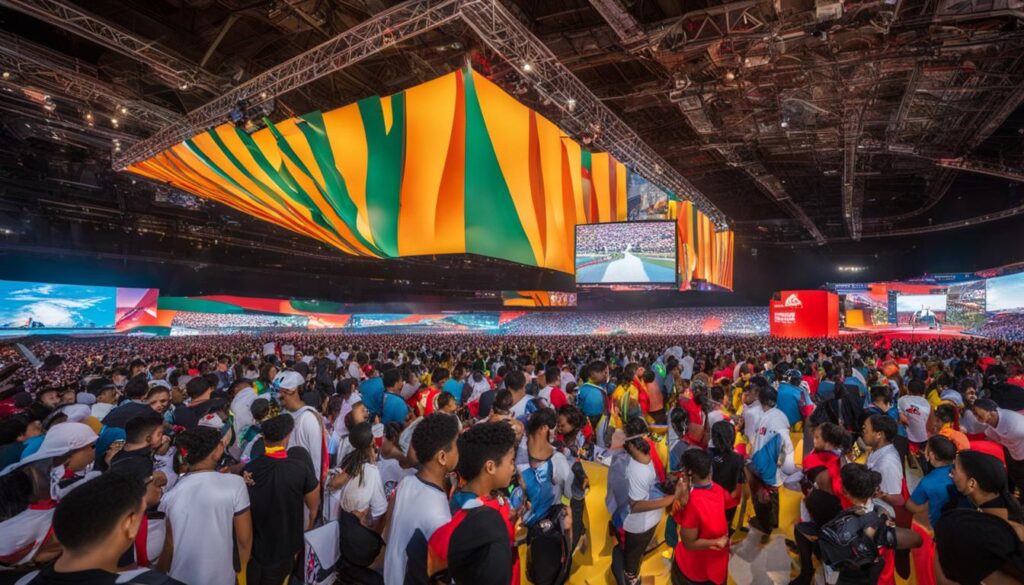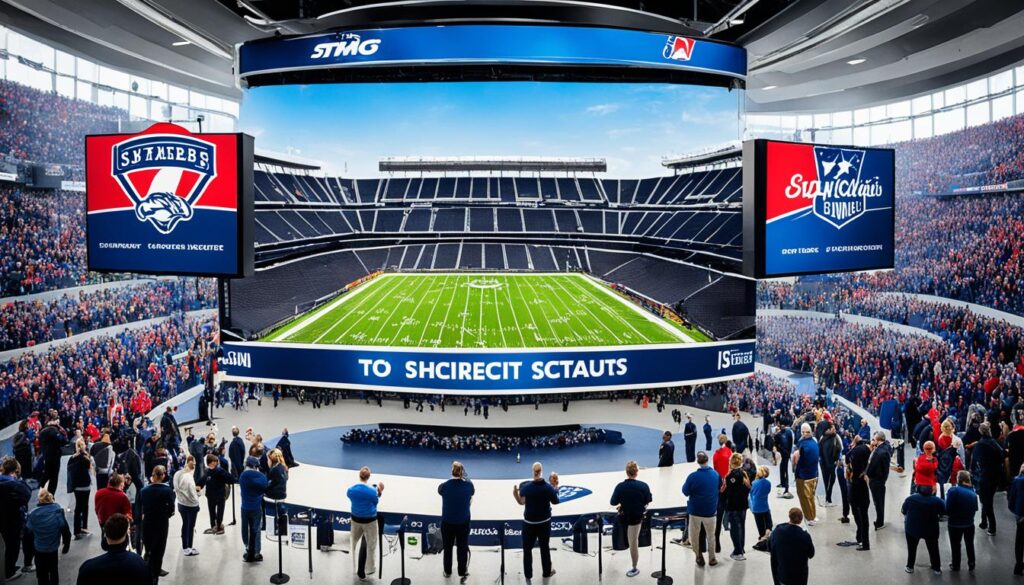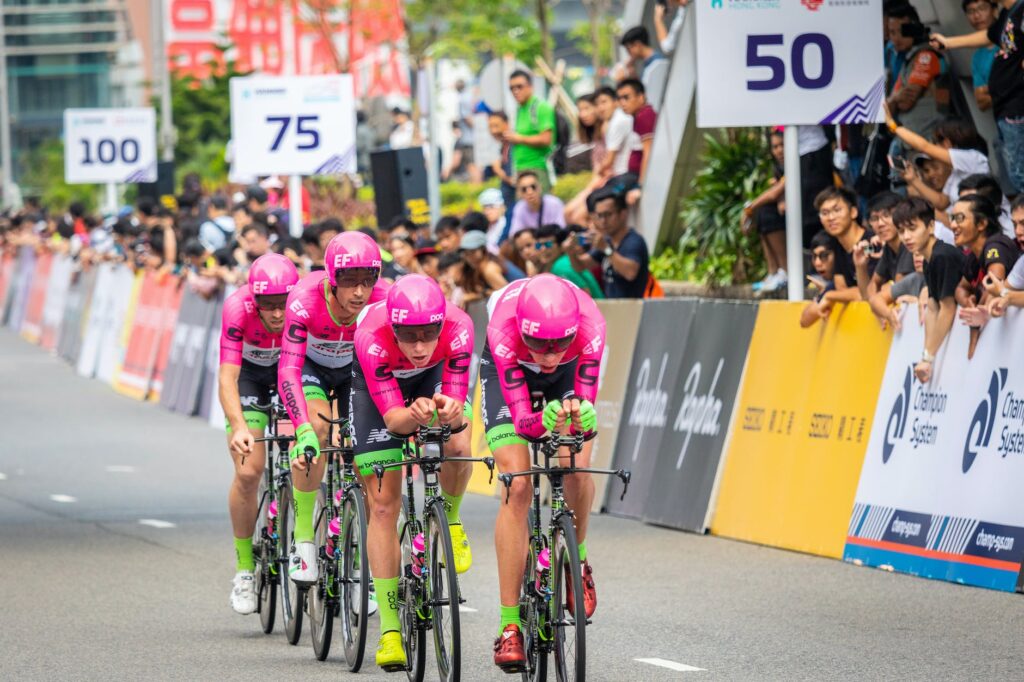Sports event bidding is the process of competing to host major sports events, such as the Olympics, World Cup, or Super Bowl.
Winning the bid for a major sports event can bring significant benefits to the host city or country, including increased tourism, economic growth, and improved infrastructure.
This guide is designed to help you understand the sports event bidding process and provide you with the necessary knowledge and tools to prepare and submit a winning bid.
Table of Content:
- Understanding the Sports Event Bidding Process
- Preparing to Bid
- Crafting a Winning Bid Proposal
- Negotiating and Finalizing the Bid
- Conclusion
Whether you are a city or country representative, a sports federation, or a private company, this guide will help you navigate the complex and competitive world of sports event bidding.
1. Understanding the Sports Event Bidding Process
To successfully bid for a major sports event, it is important to understand the bidding process. This process typically involves several stages and several key players.
Here is an overview of the bidding process:
Stage 1: Initial Bid
The initial bid involves submitting a preliminary proposal to the event organizers.
This proposal should include an overview of the host city or country, the proposed event venue, and any other relevant information.
The event organizers will review the proposals and select a shortlist of potential hosts.
Stage 2: Shortlisting
The shortlisted cities or countries will then be invited to submit a detailed bid proposal.
This proposal should include a comprehensive plan for hosting the event, including details on infrastructure, transportation, accommodation, and security.
The bid proposal will be evaluated by the event organizers based on a set of criteria, such as financial sustainability, technical capabilities, and environmental impact.
Stage 3: Final Bid Submission
The final bid submission is a revised version of the bid proposal based on feedback from the event organizers.
The final bid should include a detailed plan for the event, including a budget, marketing strategy, and risk management plan.
Stage 4: Site Visits
The event organizers will conduct site visits to the shortlisted cities or countries to assess their readiness and capabilities for hosting the event.
During these visits, the event organizers will meet with key stakeholders, such as government officials, venue owners, and the local organizing committee.
Stage 5: Decision
The event organizers will evaluate all the bid proposals and site visit reports and make a decision on the host city or country.
Key Players in the Bidding Process
Several key players are involved in the bidding process, including:
- Sports Federations: Sports federations are responsible for organizing and overseeing the event.
- National and Local Governments: National and local governments provide the necessary funding and support for hosting the event.
- Event Organizers: Event organizers are responsible for managing and coordinating all aspects of the event, from the bidding process to the actual event.
- Local Organizing Committee: The local organizing committee is responsible for managing the logistics of the event, such as transportation, accommodation, and security.
- Venue Owners: Venue owners provide the necessary facilities for hosting the event, such as stadiums, arenas, and training facilities.
Read more: Who Bids and Why (pdf)
Understanding the Components of a Successful Bid
A successful bid typically includes several components, such as a strong and detailed bid proposal, a clear understanding of the event requirements, a comprehensive budget, and a strong team with relevant expertise.
It is important to carefully review the RFP and ensure that all the requirements are addressed in the bid proposal.
The bid proposal should also highlight the strengths of the host city or country, such as its infrastructure, facilities, and culture.
Finally, building a strong team with relevant expertise is crucial for a successful bid, including individuals with experience in sports event management, marketing and promotion, finance, and logistics.
2. Preparing to Bid
Before submitting a bid proposal for a major sports event, it is essential to adequately prepare. This involves conducting research, building a strong team, and developing a comprehensive plan.
Here are some key steps to prepare for a bid:
Step 1: Research
The first step in preparing for a bid is to conduct thorough research.
This involves reviewing the RFP (Request for Proposal) provided by the sports federation or event organizers, and understanding the event requirements, including the timeline, budget, and technical specifications.
It is also important to research previous host cities or countries and learn from their successes and challenges.
Read more: Bidding to Host a Major Event (pdf)
Step 2: Build a Strong Team
Building a strong bid team is crucial for a successful bid. The team should include individuals with relevant expertise in sports event management, marketing, finance, and logistics.
It is also essential to have a strong leadership team that can effectively manage the bidding process and coordinate all aspects of the bid proposal.
Step 3: Develop a Comprehensive Plan
Developing a comprehensive plan is critical for a successful bid. The plan should include a detailed strategy for hosting the event, including infrastructure, transportation, accommodation, and security.
It is also important to consider the legacy of the event, such as the long-term economic, social, and environmental impact on the host city or country.
Step 4: Establish Partnerships and Support
Establishing partnerships and support from key stakeholders is essential for a successful bid. This includes securing funding and support from national and local governments, sports federations, venue owners, and other relevant organizations.
It is also important to build relationships with the local community and engage them in the bidding process.
Step 5: Create a Strong Bid Proposal
Creating a strong bid proposal is the final step in preparing for a bid. The bid proposal should address all the requirements outlined in the RFP, highlight the strengths of the host city or country, and provide a detailed plan for hosting the event.
It is important to ensure that the bid proposal is well-written, well-organized, and visually appealing.
Key Elements of a Strong Bid Proposal
A strong bid proposal should include the following elements:
- Executive Summary: A concise summary of the bid proposal, highlighting the key strengths of the host city or country.
- Introduction: An overview of the host city or country and its suitability for hosting the event.
- Technical Proposal: A detailed plan for hosting the event, including infrastructure, transportation, accommodation, and security.
- Marketing and Promotion Plan: A comprehensive plan for promoting the event and maximizing its exposure.
- Budget: A detailed budget that outlines all the costs associated with hosting the event.
- Legacy Plan: A plan for the long-term economic, social, and environmental impact of the event on the host city or country.
By adequately preparing for a bid, building a strong team, and developing a comprehensive plan and bid proposal, you can increase your chances of successfully bidding for a major sports event.
Read more: Sporting Event Bid Competition, University of Michigan (pdf)
3. Crafting a Winning Bid Proposal
A winning bid proposal requires more than just fulfilling the technical requirements of the event. It should showcase the host city or country’s strengths, highlight the unique features of the event, and provide a compelling vision for the future.
Here are some key elements to consider when crafting a winning bid proposal:
Key 1: Highlight the Unique Features of the Event
One of the key elements of a winning bid proposal is highlighting the unique features of the event. This could include the history of the event, the athletes or teams participating, or any innovative or unique aspects of the event.
By showcasing what sets the event apart from others, the bid proposal can stand out from the competition.
Key 2: Showcase the Strengths of the Host City or Country
Another crucial element of a winning bid proposal is showcasing the strengths of the host city or country. This could include its infrastructure, transportation, accommodation, or the cultural and historical significance of the location.
By highlighting what the host city or country can offer, the bid proposal can demonstrate its suitability for hosting the event.
Key 3: Provide a Compelling Vision for the Future
A winning bid proposal should also provide a compelling vision for the future.
This could include the legacy of the event, such as the long-term economic, social, and environmental impact on the host city or country.
It could also include plans for future developments or initiatives that will be implemented as a result of hosting the event.
Key 4: Address Technical Requirements
While highlighting the unique features and strengths of the event and host city or country is crucial, it is also important to address the technical requirements outlined in the RFP.
The bid proposal should provide a detailed plan for infrastructure, transportation, accommodation, security, and any other technical specifications required by the event organizers.
Example of RFP: Request for Proposal 2020 & 2021 NASC Sports Event Symposium (pdf)
Key 5: Make the Proposal Visually Appealing
A winning bid proposal should not only be well-written but also visually appealing.
This could include high-quality images, maps, and infographics that illustrate the proposed plans for hosting the event.
It is also important to ensure that the proposal is well-organized and easy to navigate.
Key 6: Engage the Reader
Finally, a winning bid proposal should engage the reader.
This could be achieved by incorporating personal anecdotes, stories, or quotes from key stakeholders, such as athletes or community leaders. By creating an emotional connection with the reader, the bid proposal can stand out and be memorable.
By considering these key elements when crafting a bid proposal, you can increase your chances of winning a major sports event bid.
4. Negotiating and Finalizing the Bid
Once the bid proposal has been submitted, the bidding process enters the negotiation and finalization phase. This is where the host city or country must negotiate with the event organizers to finalize the terms of the bid.
Here are some key elements to consider during the negotiation and finalization phase:
Phase 1: Negotiating the Contract
The negotiation phase involves negotiating the terms of the contract. This includes aspects such as the event schedule, the financial arrangements, and the technical specifications.
It is important to ensure that all parties agree on the terms and that the contract protects the interests of both the host city or country and the event organizers.
Phase 2: Finalizing the Contract
Once the terms have been agreed upon, the finalization phase involves signing the contract.
It is important to ensure that all parties have reviewed and agreed to the final version of the contract before signing.
Read more: A stakeholder analysis of the 2018 Olympic Winter Games French bid (Sports Management Review)
Phase 3: Developing a Marketing Plan
After the contract has been signed, the host city or country must develop a marketing plan for the event. This includes promoting the event to potential attendees, sponsors, and media outlets.
The marketing plan should highlight the unique features of the event and the host city or country, and generate excitement and interest in the event.
In this phase, there is a good idea to consider planning for how to improve the fan experience at the event.
Phase 4: Securing Funding and Sponsorship
Another important aspect of finalizing the bid is securing funding and sponsorship for the event. This includes identifying potential sponsors and developing sponsorship packages that align with the sponsor’s goals and objectives.
It is important to ensure that the funding and sponsorship arrangements are transparent and adhere to ethical standards.
Phase 5: Preparing for the Event
Finally, once the contract has been signed and the marketing plan and funding secured, the host city or country must prepare for the event.
This includes coordinating with event organizers to ensure that all technical specifications are met, preparing the event venues and accommodations, and ensuring that all staff and volunteers are trained and ready to assist with the event.
By considering these key elements during the negotiation and finalization phase, the host city or country can successfully host a major sports event and create a positive legacy for the event and the community.
Conclusion: How to Successfully Bid for Major Sports Events
Hosting a major sports event can be an exciting and rewarding experience, but it requires careful planning, preparation, and execution.
By understanding the sports event bidding process, preparing a strong bid proposal, crafting a winning bid, negotiating and finalizing the bid, and preparing for the event, the host city or country can successfully host a major sports event and create a positive legacy for the event and the community.
Key Takeaways:
- Understanding the sports event bidding process involves researching the event, assessing the host city or country’s capabilities, and identifying potential challenges and opportunities.
- Preparing to bid involves assembling a bid committee, conducting a feasibility study, and developing a strategic plan.
- Crafting a winning bid proposal involves presenting a compelling case for why the host city or country is the best choice for the event, including factors such as infrastructure, accommodations, transportation, and support from local communities.
- Negotiating and finalizing the bid involves negotiating the terms of the contract, finalizing the contract, developing a marketing plan, securing funding and sponsorship, and preparing for the event.
- Hosting a major sports event requires coordination and collaboration among event organizers, host city or country officials, and stakeholders to ensure that the event is a success and leaves a positive legacy for the community.
FAQs:
The sports event bidding process involves researching the event, assessing the host city or country’s capabilities, and identifying potential challenges and opportunities.
The key to preparing a strong bid proposal is presenting a compelling case for why the host city or country is the best choice for the event, including factors such as infrastructure, accommodations, transportation, and support from local communities.
Negotiating and finalizing the bid involves negotiating the terms of the contract, finalizing the contract, developing a marketing plan, securing funding and sponsorship, and preparing for the event.
Developing a marketing plan is important to promote the event to potential attendees, sponsors, and media outlets, highlight the unique features of the event and the host city or country, and generate excitement and interest in the event.
Successfully hosting a major sports event requires careful planning, preparation, and execution, as well as coordination and collaboration among event organizers, host city or country officials, and stakeholders to ensure that the event is a success and leaves a positive legacy for the community.
All in all, bidding for events is a crucial part of sports marketing, and something I cover in my newsletter here at SportsBizTrends.com.

Hello! I’m Magnus Berglund, a seasoned trendspotter and proud founder of SportsBizTrends.com.
With over a decade of experience as an independent advisor and consultant, I have specialized in business development and creative marketing within the sports industry. This has, among other things, resulted in a book about sports sponsorship (only available in Swedish for the moment).
If you find my writing interesting, please share it with your colleagues and friends. It would be greatly appreciated!
And yes, I do freelance consulting and provide lectures at industry events, business networks, board meetings, and similar occasions. However, since I also work as a Marketing Manager for an industrial company, I choose the occasions wisely.
That said, don’t hesitate to contact me with your inquiry.
With experience from various assignments in strategy, tactical activations, and valuation of sponsorship (from the grassroots level to the English Premier League), I am happy to share my insights and ideas in this fast-paced industry.
For more information about me and my work, including my contact details, please visit the About page, or connect with me via LinkedIn.








